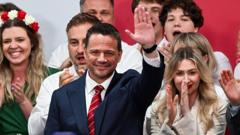As South Korean voters head to the polls, the shadow of martial law continues to loom large. Candidates Lee Jae-myung and Kim Moon-soo offer contrasting visions for the country's political recovery, with citizens desperate for change.**
South Korea's Election: A Bid for Unity Amidst Past Turmoil**

South Korea's Election: A Bid for Unity Amidst Past Turmoil**
Amidst a backdrop of recent martial law and political strife, South Korea prepares for a pivotal election that could reshape its future.**
The atmosphere in South Korea is charged as citizens brace for an election that stands as a potential turning point following last December's martial law crisis. The campaign has been dominated by Lee Jae-myung, the leading opposition candidate, who has taken to the stage in a bullet-proof vest, underscoring the very real threats he faces amid escalating political violence. Security at his rallies is palpable, with protection officers and fortified glasses making clear the gravity of the environment in which he operates.
The root of this unrest lies in the failed military takeover orchestrated by ex-president Yoon Suk Yeol. His attempt to seize control led to widespread protests and ultimately his impeachment, paving the way for this snap election. The political landscape that has emerged is characterized by deep division and a deteriorating sense of public safety. Lee’s campaign, marked by assurances to fortify democracy, has resonated with a populace weary from recent upheaval.
The ruling People Power Party (PPP), grappling with Yoon's controversial actions, has nominated Kim Moon-soo, a former labor minister who initially defended Yoon's approach. This decision is perceived by many as an endorsement of the martial law legacy, positioning Lee as a clearer alternative. Polls indicate Lee leading by approximately ten points, with his history of political activism, including defiance against Yoon's martial law, bolstering his appeal.
Yet, Lee's past is not without scrutiny. His previous failed presidential bid and ongoing legal challenges paint a complex portrait of a candidate many feel ambivalent about. Conversely, Kim is framing himself as the moderate choice amid a sea of distrust, aligned more against Lee’s controversial reputation than based on strong policy proposals.
As the election day approaches, voting patterns show a populace ready to seize this opportunity for change, gravitating towards candidates who promise to reclaim democratic integrity. Both candidates must navigate the inherent challenges of their ideological shifts while attempting to unite a fractured citizenry.
The stakes are high for whoever emerges victorious, as they inherit not just the responsibility to govern, but the commitment to mend a nation yearning for stability and democratic faith. This election is not merely about individual candidates but represents South Korea's bid to heal from its harrowing past and envision a unified future.





















